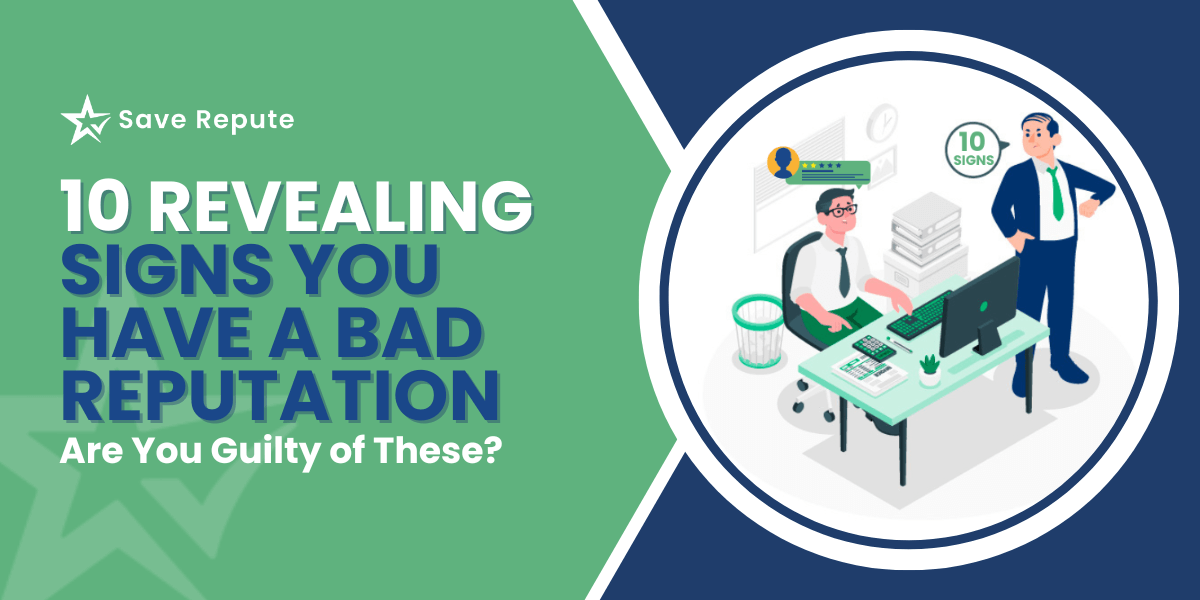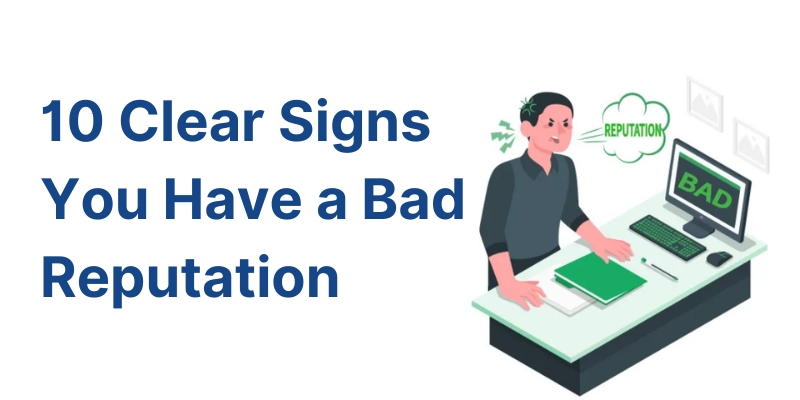Has the office people started avoiding you? Do people stop talking when you walk into a room? These could be clear signs you have a bad reputation — a reputation that might not be as positive as you imagine.
Your reputation defines how others talk to you and how people view you as a person, what opportunities come your way, and even your career growth. But many of us are in the dark when our reputation has been damaged.
The tricky part? It’s not something anyone will say to your face. Instead, you’ll see small shifts in how they interact with you.
Table of Contents
How To Tell If You Have A Bad Reputation?
Surely, you don’t want to sound toxic, rude, or negative. Your emotions just split out and you accidentally your audience met with this side of you.
Due to this factor, things are getting change. Your image and identity are first which gets hurt through this.
All of your image which you earned through hard work is demolished by your own behavior. So it’s necessary to think wisely before you take action. It’ll help you sustain your image in the long run.
What Exactly Is a Bad Reputation?
Before going into the signs, it’s important to clarify what the definition of having a bad reputation actually is. When others view you in an adverse light consistently, a negative reputation is formed. It could be your work ethic, trustworthiness, or your attitude or behavior when you are in social settings.
You don’t get a bad reputation from one mistake. It accumulates over hours, days, and years of what you do, or a pivotal moment that changes how others perceive you.
10 Clear Signs You Have a Bad Reputation
Of course bad reputation can negatively impact many areas of your life, both personal as well as work-related. But how do you recognize that your reputation is in trouble? Here are 10 clear signs that your reputation is ruined:
1. People Stop Talking When You Approach
One of the clearest indicators that your reputation is damaged that conversations stop as you enter a room. This awkward silence would indicate that folks are talking about you or subjects which they prefer you not hear.
2. You’re Left Out of Social Events
If you realize that you are frequently not invited to after-work or team lunch events, it could be more deliberate than you think. If you have a bad reputation of any sort, you will often find yourself excluded from social circles because people would rather hang out with someone they trust and enjoy than with you.
3. Your Ideas Get Ignored
During meetings, do your suggestions get overlooked while similar ideas from others receive praise? This could indicate that your negative reputation has affected how your contributions are valued, regardless of their merit.
4. People Avoid One-on-One Interactions
When colleagues go out of their way to never be alone with you or seem uncomfortable during private conversations, it’s usually because they have formed negative associations with you. If you have a bad reputation, others are careful about getting to close.
5. You’re Last to Hear Important News
Information flows through trust networks. If you consistently learn about important updates or office news after everyone else, it suggests you’re outside these networks of trust—a clear sign you have a bad reputation.
6. Your Mistakes Get Magnified
Everyone makes mistakes, but when your mistakes appear to garner disproportionate attention or criticism it is usually due to people interpreting your behavior through a lens of a corrupted reputation.
7. Body Language Becomes Closed Off
Pay attention to how people physically respond to you. Crossed arms, little eye contact, or turning away can show discomfort. This may be because they link you to negative experiences.
8. You’re Micromanaged More Than Others
If supervisors check your work more frequently or require more detailed updates than they do from your colleagues, they may not trust your ability or commitment—a sign of damaged reputation.
9. People Are Overly Formal With You
When interactions that should be casual become stiff and formal, it often means others are keeping their guard up. This professional distance can indicate they’re cautious about engaging with you due to your reputation.
10. You Get Passed Over for Opportunities
If you are qualified but passed by time and again for promotions, special projects, or leadership roles, your reputation may be the invisible hand that’s holding you back.
How to Know if You Have a Bad Reputation for Sure?
If you’re wondering “Do I have a bad reputation?” but aren’t certain based on the signs above, here are some approaches to gain clarity:
Ask a Trusted Colleague
Find someone you trust who will give honest feedback. Ask specific questions like, “Have you heard concerns about my work style?” rather than the broad “Do people like me?”
Notice Patterns Across Different Groups
If you experience similar treatment across various teams or social groups, it’s more likely related to your reputation rather than isolated personality conflicts.
Reflect on Your Recent History
Think about significant incidents or conflicts that might have damaged others’ perception of you. Even one major incident can create a lasting negative impression.
Look for Consistency in Feedback
During performance reviews or casual feedback, do similar themes emerge? Consistent criticism about certain behaviors suggests reputation issues.
What Happens If You Have a Bad Reputation?
The downsides of a bad reputation go beyond awkward social chatter:
Career Limitations
Whether we get promoted or have opportunities often has little to do with our skills and a lot more to do with how much people trust and want to work with us. A bad reputation – it’s like an invisible ceiling.
Reduced Influence
Your ability to persuade others and implement ideas diminishes significantly when your reputation is damaged.
Mental Health Impact
It is psychologically taxing to live with a bad reputation. This persistent sense of ostracism and judgment can cause anxiety, reduced confidence and even depression.
Self-Fulfilling Prophecy
If you know you have a bad reputation, you may become defensive or withdraw, and this can feed into what others think of you.
How to Recover From a Bad Reputation?
If you have determined you have a bad reputation, it is all not lost. Reputations can be rebuilt through consistent effort:
1. Take Honest Inventory
First, understand specifically what’s caused your reputation problems. Is it missed deadlines, gossip, poor communication or what?
2. Own Your Mistakes
Own what you did wrong without excuses. Just acknowledging this, “I know I’ve let people down in the past, and I’m trying to change that,” as simple as it sounds, will be enough to go a long way.
3. Change Behavior Visibly
But this is the well-known adage, actions speak louder than words. Implement changes that directly address the problems that harmed your reputation, and ensure those changes are visible.
4. Rebuild Trust Gradually
Trust returns slowly. Start with small commitments you can absolutely keep, then gradually take on larger responsibilities as you prove reliability.
5. Seek Feedback Regularly
Ask for ongoing feedback about your improvement efforts. This shows you’re serious about change and helps you adjust your approach as needed.
6. Be Patient
Recovering from having a bad reputation takes time—sometimes significantly longer than it took to develop the negative perception in the first place.
7. Consider a Fresh Start
In some cases, if your reputation is severely damaged in one environment, a new job or social circle might provide the opportunity to establish yourself differently from the beginning.
Signs You Have a Good Reputation (For Comparison)
To understand what you’re working toward, here are signs you have a good reputation:
- People seek your opinion and advice
- You’re included in important decisions
- Colleagues want to collaborate with you
- Your mistakes are viewed as learning opportunities rather than character flaws
- You receive the benefit of the doubt in ambiguous situations
- Others speak positively about you when you’re not present
Final Thought
Recognizing that “I have a bad reputation” is uncomfortable but necessary for growth. By identifying the signs you have a bad reputation and taking consistent steps toward improvement, you can gradually rebuild how others perceive you.
Keep in mind that reputations are not forever — they are the cumulative result of your actions over time. If you represent a negative reputation you will open doors for yourself rather than close them by continually showing up better and new.
This journey can feel daunting, going from “I know I have a bad reputation” to “People actually trust, respect, and like me,” but it is not only possible — it happens all the time when you have self-awareness, humility, and commitment.
FAQs
How do I know if I have a bad reputation?
You likely have a bad reputation if people avoid you, conversations stop when you enter rooms, and you’re consistently excluded from social events and important decisions.
What makes someone have a bad reputation?
Bad reputations typically come from consistent negative behaviors like breaking promises, gossiping, being unreliable, or treating others poorly.
How do you know if you have a good reputation?
You have a good reputation when people seek your advice, readily include you in activities, and speak positively about you to others.
What to do if you have a bad reputation?
Acknowledge your mistakes, visibly change problematic behaviors, and rebuild trust through consistent positive actions over time.



